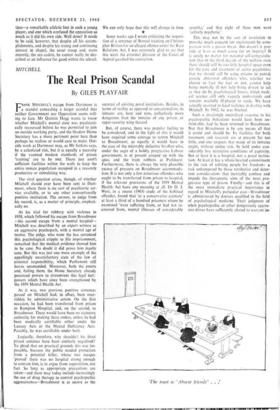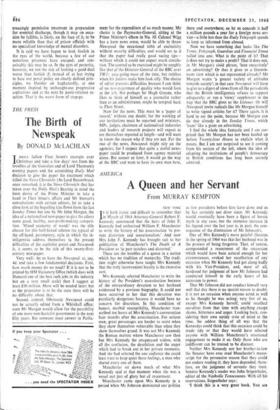The Real Prison Scandal
MITCHELL
By GILES PLAYFAIR
The vital question arises, though, of whether Mitchell should ever have been sent to Dart- moor, where there is no sort of psychiatric ser- vice available, or to any other conventionally punitive institution. The answer, to judge from his record, is, as a matter of principle, emphati- cally no.
At his trial for robbery with violence in 1958, which followed his escape from Broadmoor —his second escape from a mental hospital— Mitchell was described by an expert witness as an aggressive psychopath, with a mental age of twelve. The judge, who none the less sentenced this psychological cripple to life imprisonment, remarked that the medical evidence showed him to be sane. No doubt it did prove him legally sane. But this was just one more example of the appallingly unsatisfactory state of the law of criminal responsibility, which Parliament still leaves unamended. Moreover, both the courts and, failing them, the Home Secretary already possessed powers to circumvent this legal test: powers which have since been strengthened by the 1959 Mental Health Act.
As it was, two previous punitive sentences passed on Mitchell had, in effect, been over- ridden by administrative action. On the first occasion, he had been transferred from prison to Rampton Hospital, and, on the second, to Broadmoor. There would have been no statutory authority for making these orders, unless he had been medically -certifiable either under the Lunacy Acts or the Mental Deficiency Acts. Possibly, he was certifiable under both.
Logically, therefore, why shouldn't his third prison sentence have been similarly negatived? To plead that on practical grounds this was im- possible, because the public needed protection from a potential killer, whose two escapes 'proved' there was no hospital strong enough to contain him, is to argue from superstition, not fact. So long as appropriate precautions are taken—and these may today include increasingly the use of drug therapy to control psychopathic aggressiveness—Broadmoor is as secure as the securest of existing penal institutions. Besides, in terms of reality as opposed to sensationalism, its inmates are, here and now, collectively more dangerous than the inmates of any prison, or super-security wing thereof.
But, of course, there was popular feeling to be considered, and in the light of this it would have required some courage to return Mitchell to Broadmoor; as equally it would have in the case of the miserably defective Straffen who, under the aegis of a boldly progressive Labour government, is at present cooped up with the spies and the train robbers at Parkhurst. Furthermore, there is always the very plausible excuse of pressure on Broadmoor accommoda- tion. It is not only a few notorious offenders who ought to be transferred from prison to hospital, if the relevant provisions of the 1959 Mental Health Act have any meaning at all. Dr D. J. West, in a recent (1963) study of the habitual offender, found that 'at a conservative estimate' at least a third of a hundred prisoners whom he examined 'were suffering from, or had not re- covered from, mental illnesses of considerable
The toast is "Absent friends" . severity,' and that eight of these men were 'actively psychotic.'
This may not be the sort of revelation to provoke much concern (or excitement) by com- parison \\ ith a prison break. But doesn't it pro- vide at least as much cause for an inquiry? It is surely no matter for national self-congratula- tion that in the third decade of the welfare state there should still be too little hospital space even for the care and treatment of active psychotics; that we should still be using prisons to punish grossly abnormal offenders who, whether we choose to face the fact or not, cannot help being mentally ill nor help being driven to act as they do by psychological forces, which medi- cal science still only vaguely understands and remains woefully ill-placed to study. We have actually resorted to legal violence in dealing with Mitchell. In 1962, he was birched.
Such a shockingly uncivilised response to his psychopathic behaviour would have been un- thinkable, had he been returned to Broadmoor. Not that Broadmoor is by any means all that it could and should be. Its facilities for both treatment and research are at present far too little, and one suspects that many of its inmates might, without undue risk, be held under con- siderably less restrictive conditions of captivity. But at least it is a hospital, not a penal institu- tion. At least it has a whole-hearted commitment to the task of refitting people for freedom: a task unhampered by those retributive and deter- rent considerations that inevitably confuse and impede the therapeutic aims of the most pro- gressive type of prison. Finally—and this is of the most immediate practical importance in regard to Mitchell's particular case—Broadmoor is administered by doctors qualified in the field of psychological medicine. Their judgment of when psychopathic or other dangerously aggres- sive drives have sufficiently abated to warrant in. creasingly permissive treatment in preparation for eventual discharge, though it may on coca- sion be fallible, is likely, on the face of it, to be more reliable than that of prison officials with no specialised knowledge of mental disorders.
It is said we have begun to look foolish in the eyes of the world, because a few of our notorious prisoners have escaped; and con- ceivably this may be so. In the eyes of posterity, however, we run the risk of looking a good deal worse than foolish if, instead of at last trying to base our penal policy on clearly defined prin- ciples, we blunder on haphazardly, at one moment inspired by unthought-out progressive aspirations and at the next by panic-stricken re- action. That is the worst form of stop-go.































 Previous page
Previous page